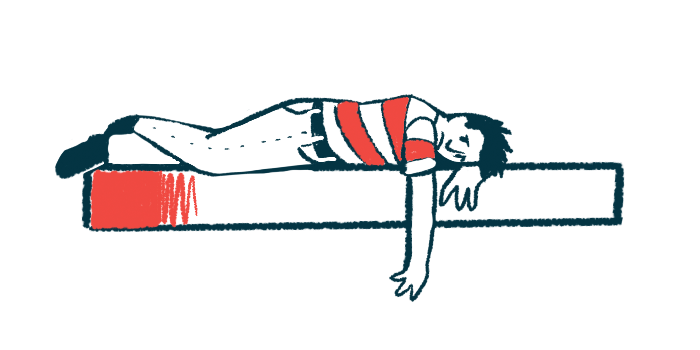Effective CFTR modulator use appears to ease depression with CF
CF-related diabetes seen as factor for poorer mental health in younger patients

Anxiety and depression are more likely in younger cystic fibrosis (CF) patients with CF-related diabetes and more evident mental health challenges, a long-term study in teenagers and young adults reported.
Poorer lung function is considered to affect mental health with CF, and the lung health of these patients improved with the start of more effective CF treatment across the study’s six years.
“Individuals who may need more mental health support are those with reduced lung function and [CF-related diabetes] as these physical health factors make daily life more challenging,” the researchers wrote.
Better access to more effective CF modulator therapies, which address the disease’s underlying cause, appears to help protect against depression, its researchers stated. They noted improvements in patients’ physical health — including lung function and body mass — as more began modulator treatment and, particularly, were prescribed Trikafta (elexacaftor/tezacaftor/ivacaftor), a next-generation modulator.
The study, “Longitudinal mental health trends in cystic fibrosis,” was published in the Journal of Cystic Fibrosis.
More attention given to physical than mental health with cystic fibrosis
The care of people with CF has mainly focused on assessing and treating the disease’s physical symptoms. However, mental health issues, such as depression and anxiety, are known to impact patients’ quality of life and clinical outcomes, yet they receive less attention.
Likewise, few studies have evaluated mental health issues among children with CF, or the impact of the COVID-19 pandemic on the mental health of all CF patients.
The CF Center at the Cincinnati Children’s Hospital Medical Center in Ohio, based on Cystic Fibrosis Foundation and European Cystic Fibrosis Society guidelines, began routine mental health screenings for its patients, ages 12 and older, in 2016. Screenings for anxiety and depressive symptoms, given on average every three months, are conducted by a team that includes a psychologist and two social workers, with interventions provided as needed.
Researchers, led by those at that hospital, investigated the prevalence and severity of depression and anxiety in 150 patients, ages 12 to 22, based on records collected between January 2015 and December 2021.
All took part in at least one routine mental health screening at the center, and study analyses covered data from 1,670 completed screenings conducted over six years in these 150 people. The group’s mean age was 14.9, and 57% were female.
Anxiety’s severity was measured using the Generalized Anxiety Disorder-7 (GAD-7) questionnaire, and that of depressive symptoms by the Patient Health Questionnaire-9 (PHQ-9). Both validated scales ask individuals to rate how often they experienced anxiety or depression in the past two weeks. Higher scores indicate more severe or prevalent symptoms.
Greater mental health issues seen with CF-associated diabetes
A total of 843 GAD-7 evaluations were performed over the study’s years, at an average rate of 1.4 per year. The number of evaluations given increased with time, the researchers noted, even during the COVID-19 pandemic. Patients’ mean value was 6.2, corresponding to mild anxiety on the GAD-7 scale, whose scores runs from zero to 21.
Similar results were observed with PHQ-9 evaluations of depressive symptoms, whose scale ranges from zero to 27. From a total of 827 PHQ-9 evaluations — about 1.3 per person per year — the mean score was 6.6, indicating mild depression.
Symptoms of both anxiety and depression decreased over time, although the differences were not statistically significant, the researchers wrote. No changes in symptom severity were noted during the pandemic.
Specifically, about one-third of patients with moderate to severe initial GAD-7 anxiety scores (range of 11 to 16) “moved to the minimal/mild range within the same calendar year across the 6 years,” the researchers wrote. Likewise, between 23% and 50% of those with moderate to severe initial PHQ-9 scores for depression (range, 10 to 14) had minimal or mild range scores on a later evaluation that year.
“The longitudinal trends in mental health symptom scores observed in this study are reassuring, with stable symptom scores overall and increasing frequency of minimal scores,” reflecting “no self-reported impact on mood, anxiety, activities, sleep, attention and concentration, and appetite in an individual’s daily life,” the researchers wrote.
However, higher utilization of mental health services and the presence of CF-related diabetes, a common CF complication, were found to associate with more severe anxiety and depression.
“In terms of factors associated with increased symptom severity for both anxiety and depression, having and managing [CF-related diabetes] is a clinical factor that warrants attention,” they wrote.
A greater need for mental health services, both psychology and psychiatry, also associated with higher screening scores.
Rise in effective CFTR modulator use likely factor in mental health gains
Factors including a patient’s age, sex, body mass index (BMI), and rate of pulmonary exacerbations over the previous year did not associate with mental health severity.
Greater use of CFTR modulators, especially Trikafta, during the study likely helped, particularly among patients with depressive symptoms.
“Notably, all physical health measures improved over the course of the six years with higher BMI and [forced expiratory volume in one second] and decreased number of exacerbation, likely due to the impact of … (CFTR) modulator treatment being initiated for more individuals,” the researchers wrote.
Modulator use rose from 59% in 2016 to 96% in 2021, and 90% of these patients were using Trikafta by its final year. Those on these therapies showed less severe depressive symptoms.
“Having access to a more effective CFTR modulator may serve as a protective factor or buffer against the experience of symptoms of depression than symptoms of anxiety,” the researchers wrote, suggesting this may be due to the reduction in inflammation associated with these therapies.








